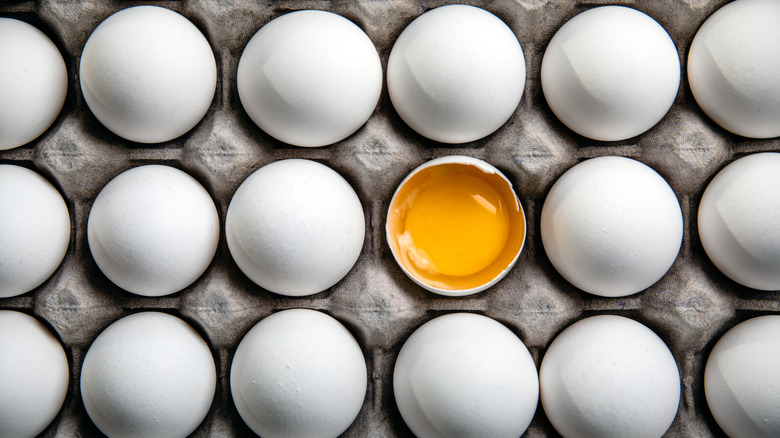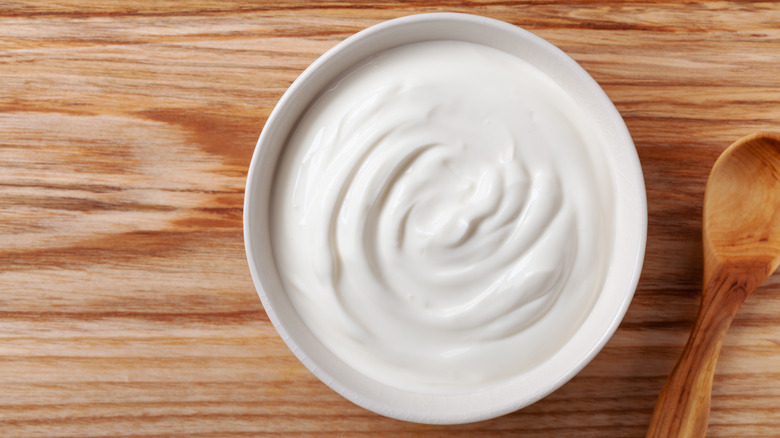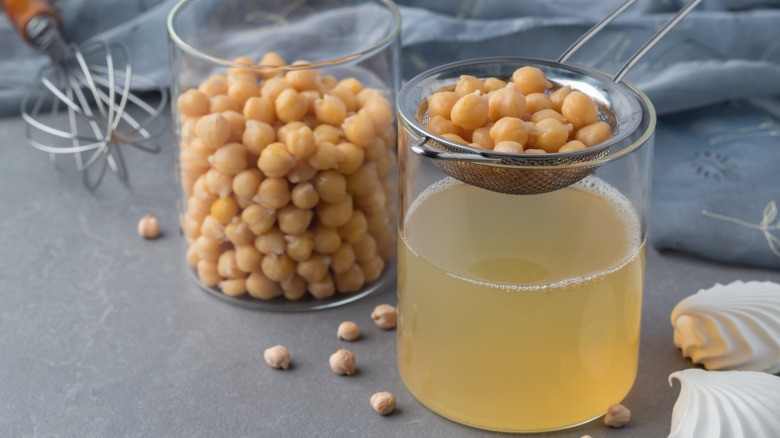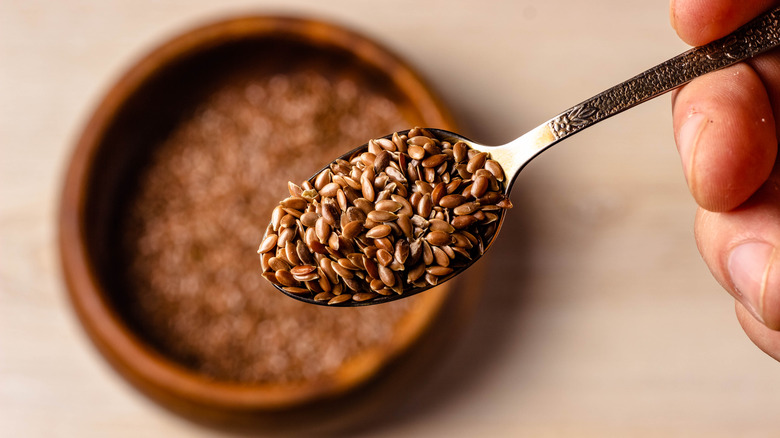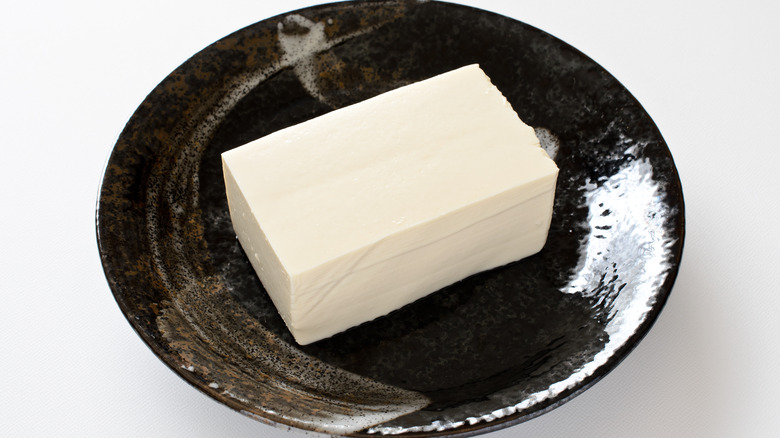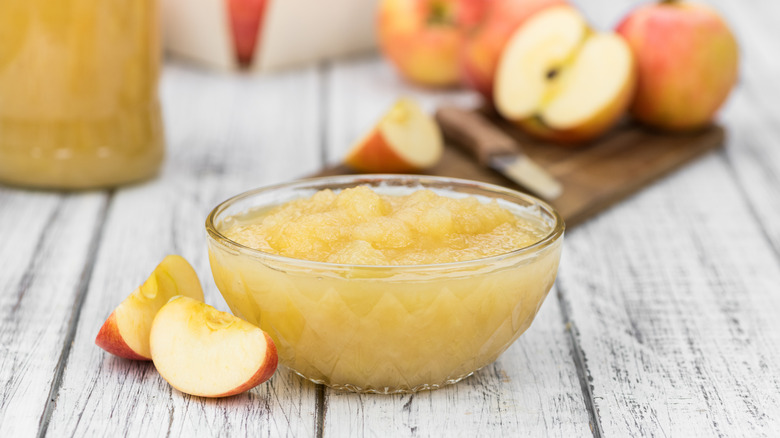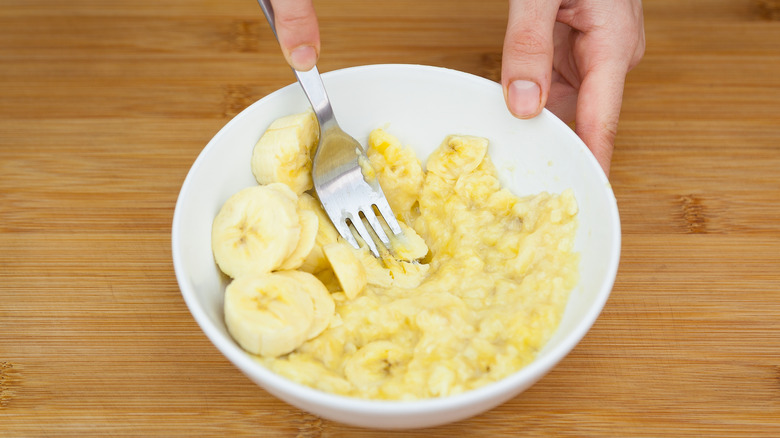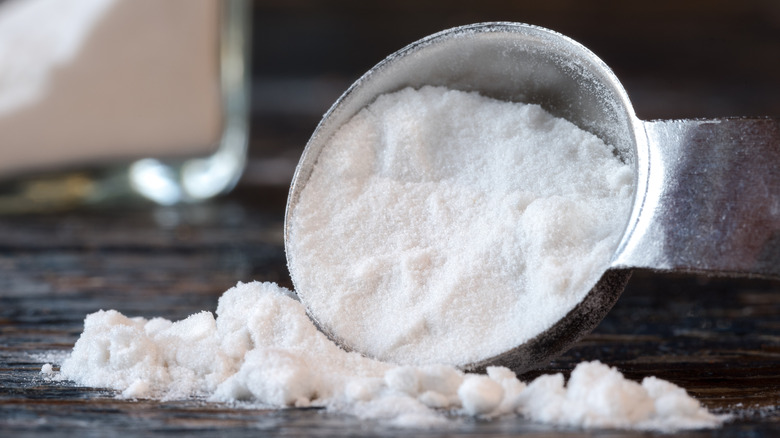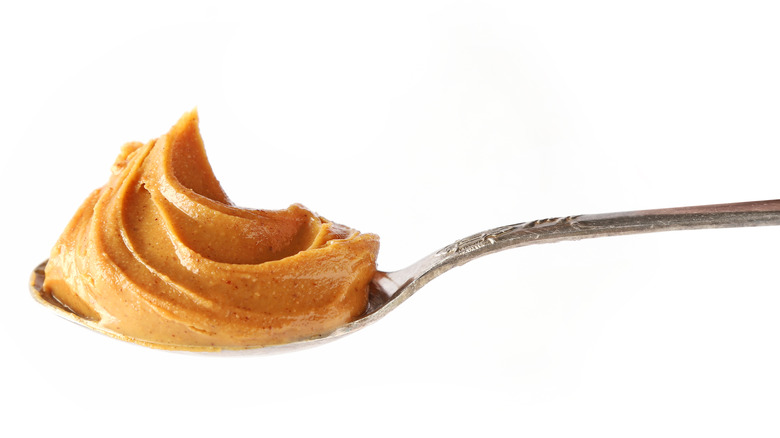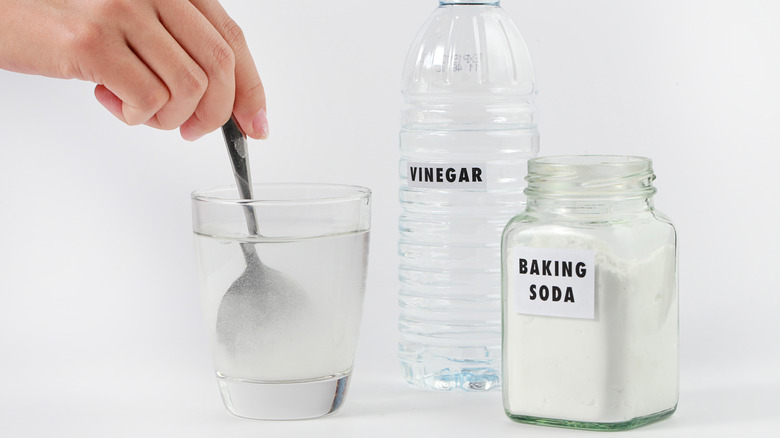10 Best Substitutes For Eggs
Most baking recipes call for eggs. If you're a vegan, follow a diet that doesn't include eggs, or simply don't have any on hand (and a last-minute run to a grocery store seems more effort than it's worth), the need for eggs can be frustrating. It doesn't help that eggs can seem irreplaceable in a recipe — and not just at breakfast.
Eggs play an important role, particularly in baking. They add structure, build texture, and enrich flavor in every bite (via The Kitchn). Egg yolks help bind liquids and fat together and prevent them from separating. Meanwhile, when whipped, egg whites act as a natural leavening agent that helps delicate cakes and soufflés rise. When both parts of the egg are used together, you get nearly perfect bakes. Eggs bind ingredients, add moisture, and act as leavening agents. That means, if eggs are not substituted correctly, your recipes simply won't turn out well. If you find yourself in a baking emergency, there are plenty of reliable substitutes for eggs.
1. Yogurt
Yogurt is one of the handiest substitutes for eggs and it can be a vegan one too. The Spruce Eats says that while you can use both dairy and plant-based vegan yogurts, vegan yogurts have a certain amount of starch and gum in addition to plant-based milk and probiotics. This means that vegan yogurts can act as thickeners similar to the way eggs do, more than dairy yogurts can. The site also says that plain yogurts work best, but you could also use flavored yogurts to add different tastes to your bakes. Yogurt works best as a substitute in quick breads, cakes, muffins, and cupcakes and not so much in anything that uses chocolate. That's because the flavor of yogurt and chocolate mixed together isn't too pleasant.
The Pioneer Woman recommends only using yogurt in addition to another leavening agent when you're baking. Yogurt works more as a binding agent and adds moisture to your bakes rather than making them rise beautifully high.
You can use 1/4 cup (60 grams) of yogurt to substitute one egg.
2. Aquafaba
Aquafaba is liquid found in canned beans or the liquid leftover from cooking beans. It's a convenient vegan replacement for eggs and, according to The Kitchn, its popularity might have something to do with its properties. They say that the composition of carbs, protein, and soluble plant solids does most of the same work as an egg. Aquafaba is so effective that The Pioneer Woman calls it "liquid gold" when it comes to substitutes for eggs. It does have its drawbacks, though. When testing aquafaba to make a batch of muffins, The Kitchn found that they turned out to be fairly dry and chewy.
The Spruce Eats says that aquafaba works best when it's whipped just like raw egg whites. Whipped aquafaba can be used to make any recipes that call for egg whites including mousse, macarons, and meringues.
You can use 3 tablespoons of aquafaba to replace one large egg and two tablespoons of unwhipped aquafaba to replace one egg white.
3. Ground Flaxseed
Flaxseeds are tiny seeds that when ground and mixed with water, make a flax egg. Apart from working as egg replacers, flax seeds are also high in omega-3 fatty acids and fiber, making the seeds a nutritious addition to any recipe (via Healthline). The Spruce Eats cautions that flax seeds have a savory taste and a grainy texture so it's best to only use them in recipes with strong flavors that can mask flax seeds, such as carrot cakes and bran muffins. Healthline too warns that using a flax egg can cause bakes to turn out heavier and dense.
The trick to making a flax egg is to mix ground flaxseeds with water and leave the mixture in the refrigerator for 15 minutes. After this, the mixture will get the same consistency as that of an egg (via Jessica In The Kitchen).
Mixing 1 tablespoon (7 grams) of ground flaxseed with 3 tablespoons of water (45 grams) will make one egg.
4. Silken Tofu
Silken tofu may not be what you think of when pondering egg substitutes, but you might be surprised by how well it can work. Tofu is quite bland and flavorless by itself and that's ideal when you're using it to replace eggs in your bakes (via The Spruce Eats). It adds protein and volume to bakes, acts as a binder, adds moisture, and because it has no flavor of its own, it can be a versatile egg substitute.
When using silken tofu, make sure to blend it into a smooth puree and get rid of all the lumps. The Pioneer Woman suggests using tofu in bakes with other leavening agents like baking soda and baking powder. It also works particularly well in baked goods like cakes and brownies that are dense and heavy.
You'll need 1/4 cup (60 grams) of pureed tofu for every egg you want to substitute in your recipe.
5. Applesauce
Applesauce is made by blending cooked apples into a puree and usually has a sweetener and certain spices like cinnamon and nutmeg added to it. When using store-bought applesauce, Healthline recommends buying one without any sugar or sweeteners in it. However, if you do have an already sweetened applesauce, make sure to tweak your recipe to reduce the amount of sugar and sweeteners that you add to it.
Spoon University says that applesauce, when used as a vegan substitute for eggs, makes moist cakes that have the consistency and texture of a brownie. If you're using applesauce, you may need to increase your bake time by two to three minutes so that it cooks through. You will also need to add half a teaspoon of baking powder to your batter if you want to avoid flat bakes.
You can use 1/4 cup of applesauce to substitute one egg in your recipe.
6. Mashed Banana
Just like applesauce, mashed bananas are an easy and handy plant-based substitute for eggs. Using mashed bananas in place of eggs means that your bakes will get the moisture and volume that they need without the added fat from the eggs (via The Spruce Eats). They work well in fruity bakes like muffins and cupcakes.
There are a few things to be cautious about when using bananas in place of eggs. Mashed bananas have no binding properties. So, The Spruce Eats suggests only using them in recipes that don't rely too heavily on a binding agent. When using bananas, you will need ripe ones so that they mash easily without leaving any lumps. Since ripe bananas have a distinctly sweet flavor of their own, the website suggests reducing the sweeteners in your recipe when using mashed bananas in place of eggs. They recommend subtracting one teaspoon of sugar or other sweeteners for every banana you use. Mashed bananas will also darken when they bake so it's best to use another egg substitute if you want a baked good that is light in color.
For best results, use 1/4 cup of mashed banana for every egg you want to substitute in your recipe.
7. Carbonated Water
Carbonated water is a surprisingly effective substitute for eggs. The Kitchn finds that carbonated water is one of the best substitutes to eggs and an even more effective one than aquafaba and flax eggs. The site compared a batch of muffins baked with eggs with a batch made from carbonated water in place of eggs and found almost no difference between the two. Muffins made with carbonated water as a replacement for eggs tuned out to have a crisp exterior and were moist and tender inside.
Healthline suggests that carbonated water's effective use as an egg substitute might have to do with carbonation. Carbonation traps air bubbles inside the bakes, making them come out light, fluffy, and moist. It works as an excellent egg substitute in baked goods that are meant to be tender and delicate.
To replace one egg in your recipe, you will want 1/4 cup of carbonated water.
8. Arrowroot Powder
Arrowroot is a tuber native to South America, and arrowroot powder is made from its starchy roots. According to Healthline, arrowroot is similar to cornstarch and works in quite a similar way. It can be used to thicken sauces, gravies, and custards and can be mixed with water and used in baking as a substitute for eggs.
The Kitchn found that using arrowroot powder as an egg substitute, made their muffins extra sweet and a little dry. However, Jessica Gavin writes on her website that arrowroot is grain-free and can therefore work very well as a thickening agent in Whole30 and Paleo bakes. Arrowroot powder can also be a structure-building substitute for eggs in gluten-free bakes.
To use arrowroot powder, mix 2 tablespoons (18 grams) of arrowroot powder with 3 tablespoons (45 grams) of water to substitute one egg.
9. Nut Butter
Apart from being spread on toast and added to shakes and smoothies, nut butters like peanut, cashew, and almond butter can be used as egg substitutes in baking too. You will be surprised to find how well peanut butter, in particular, can work. Nut butters are full of the same healthy fats that eggs have and work as binding agents in bakes just as well as eggs can (via Taste Of Home). As a bonus, they also give baked goods a creamier texture, add a nutty flavor to them, and can be added to anything from muffins and cookies to pancakes and waffles. If you want your bakes to be a little crunchy, Spoon University suggests using chunky peanut butter instead of creamy peanut butter.
To substitute eggs with nut butters, you can use 3 tablespoons of any nut butter of your liking for every egg in your recipe.
10. Vinegar and Baking Soda
For bakes that depend on eggs to rise, it might seem too daunting a task to remove eggs and substitute them with something else. For delicate bakes where eggs are the primary leavening agents, vinegar and baking soda work best.
Vinegar and soda work together to create an erupting volcano-like reaction. When mixed together, they react with each other to create carbon dioxide and water (via Healthline). This reaction makes fluffy doughs and light and airy breads that rise beautifully. However, Food52 cautions that while the combination of vinegar and baking soda will help your bakes rise and is one of the best egg substitutes, this combination is also one of the most sensitive egg substitutes and easy to mess up.
Mixing 1 teaspoon (7 grams) of baking soda with 1 tablespoon (15 grams) of white vinegar or apple cider vinegar will replace one egg in your recipe.
